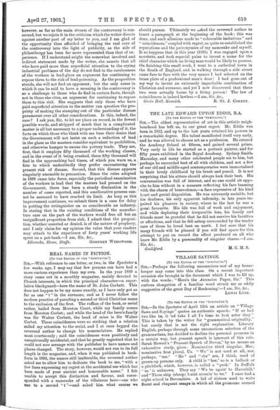REAL NAMES IN FICTION.
[To TUE EDITOR OF THE "SPECTATOR."] Sra,—With reference to one letter, or two, in the Spectator a few weeks ago, I may say that few iiersons can have had a more curious experience than my own. In the year 1889 a story came out in a monthly magazine, mainly devoted to Church interests, in which the principal character—a super- lative blackguard—bore the name ofSt. John Corbett. This does not happen to be my name exactly, as I have only got as far as one " t " in the surname, and as I never follow the modern practice of parading a second or third Christian name to the exclusion of the first. The ruffian of the book, or serial rather, hailed from Moreton Court, while my family comes from Moreton Corbet ; and while the head of the hero's family was Sir Walter Corbett, the head of mine is Sir Walter Corbet. These coincidences were so striking that a relation called my attention to the serial, and I at once begged the reverend author to change his nomenclature. He replied most courteously ; said the coincidences were positively and unequivocally accidental, and that he greatly regretted that he could not now arrange with the publisher to have names and places changed. The story, however, would not run to its full length in the magazine, and, when it was published in book. form in 1895, the names still inalterable, the reverend author asked me to allow him to dedicate the book to me, "with a few lines expressing my regret at the accidental use which has been made of your ancient and honourable name." I felt unable to accept this distinction and favour, and corre- sponded with a namesake of the villainous hero—one who ran to a second "t "—and asked him what course we
should pursue. Ultimately we baked the reverend author to insert a paragraph at the beginning of the book : this was done, and such allusions made to "colourable imitations" and coincidences," coupled with regret. as quite re-established the reputations and the patronymics of my namesake and myself. It so happens that in this year (1895) I was engaged upon a novelette, and took especial pains to invent a name for the chief character which no living man would be likely to possess. On finishing this small work, I went to a cathedral town in the South of England, and in walking through a side street came face to face with the very names I had selected on the brass plate of a professional man's door! I had gone out of my way to invent an extremely improbable combination of Christian and surname, and yet I now discovered that these two were actually borne by a living person! The law of coincidences is indeed lawless.—I am, Sir, &c.,






















































 Previous page
Previous page